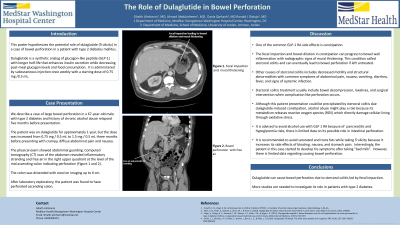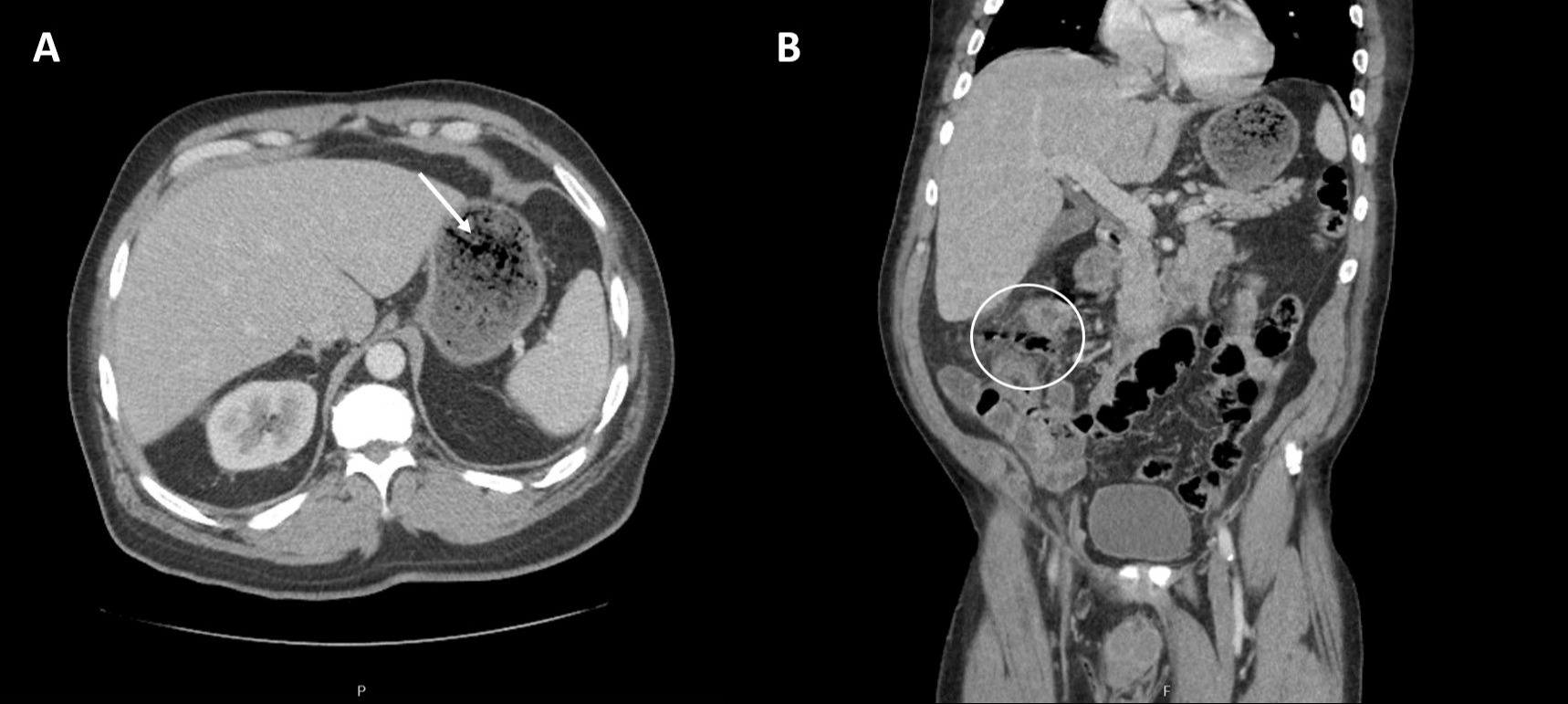Monday Poster Session
Category: Colon
P1970 - The Role of Dulaglutide in Bowel Perforation
Monday, October 28, 2024
10:30 AM - 4:00 PM ET
Location: Exhibit Hall E

Has Audio

Ghaith Almhanni, MD
MedStar Georgetown University Hospital
Washington, DC
Presenting Author(s)
Ghaith Almhanni, MD1, Ahmad Abdulraheem, MD1, Dania Qarkash, MD2, Ronald Distajo, MD1
1MedStar Georgetown University Hospital, Washington, DC; 2University of Jordan School of Medicine, Washington, DC
Introduction: This article hypothesizes the potential role of dulaglutide (Trulicity) in a case of bowel perforation in a patient with type 2 diabetes mellitus. There is limited data in the literature regarding this possible adverse effect.
Dulaglutide is a synthetic analog of glucagon-like peptide (GLP-1) with longer half-life that enhances insulin secretion while decreasing post-meal glucagon levels and food consumption. It is administered by subcutaneous injection once weekly with a starting dose of 0.75 mg / 0.5 mL.
Case Description/Methods: We describe a case of large bowel perforation in a 67-year-old male with type 2 diabetes and history of chronic alcohol abuse relapsed five months before presentation. The patient was on dulaglutide for approximately 1 year, but the dose was increased from 0.75 mg / 0.5 mL to 1.5 mg / 0.5 mL three months before presenting with crampy, diffuse abdominal pain and nausea. The physical exam showed abdominal guarding. Computed tomography (CT) scan of the abdomen revealed inflammatory stranding and free air in the right upper quadrant at the level of the mid ascending colon indicating perforation (Figure). The colon was distended up to 6 cm with stool on imaging. After laboratory exploratory, the patient was found to have perforated ascending colon.
Discussion: One of the common GLP-1 RA side effects is constipation. The fecal impaction and bowel dilation in constipation can progress to bowel wall inflammation with radiographic signs of mural thickening. This condition called stercoral colitis and can eventually lead to bowel perforation if left untreated. Although this patient presentation could be precipitated by stercoral colitis due dulaglutide-induced constipation, alcohol abuse might play a role because its metabolism releases reactive oxygen species (ROS) which directly damage cellular lining through oxidative stress. More studies are needed to investigate the role of dulaglutide with stercoral colitis and bowel perforation in patients with type 2 diabetes.

Disclosures:
Ghaith Almhanni, MD1, Ahmad Abdulraheem, MD1, Dania Qarkash, MD2, Ronald Distajo, MD1. P1970 - The Role of Dulaglutide in Bowel Perforation, ACG 2024 Annual Scientific Meeting Abstracts. Philadelphia, PA: American College of Gastroenterology.
1MedStar Georgetown University Hospital, Washington, DC; 2University of Jordan School of Medicine, Washington, DC
Introduction: This article hypothesizes the potential role of dulaglutide (Trulicity) in a case of bowel perforation in a patient with type 2 diabetes mellitus. There is limited data in the literature regarding this possible adverse effect.
Dulaglutide is a synthetic analog of glucagon-like peptide (GLP-1) with longer half-life that enhances insulin secretion while decreasing post-meal glucagon levels and food consumption. It is administered by subcutaneous injection once weekly with a starting dose of 0.75 mg / 0.5 mL.
Case Description/Methods: We describe a case of large bowel perforation in a 67-year-old male with type 2 diabetes and history of chronic alcohol abuse relapsed five months before presentation. The patient was on dulaglutide for approximately 1 year, but the dose was increased from 0.75 mg / 0.5 mL to 1.5 mg / 0.5 mL three months before presenting with crampy, diffuse abdominal pain and nausea. The physical exam showed abdominal guarding. Computed tomography (CT) scan of the abdomen revealed inflammatory stranding and free air in the right upper quadrant at the level of the mid ascending colon indicating perforation (Figure). The colon was distended up to 6 cm with stool on imaging. After laboratory exploratory, the patient was found to have perforated ascending colon.
Discussion: One of the common GLP-1 RA side effects is constipation. The fecal impaction and bowel dilation in constipation can progress to bowel wall inflammation with radiographic signs of mural thickening. This condition called stercoral colitis and can eventually lead to bowel perforation if left untreated. Although this patient presentation could be precipitated by stercoral colitis due dulaglutide-induced constipation, alcohol abuse might play a role because its metabolism releases reactive oxygen species (ROS) which directly damage cellular lining through oxidative stress. More studies are needed to investigate the role of dulaglutide with stercoral colitis and bowel perforation in patients with type 2 diabetes.

Figure: A- Fecal impaction leading to bowel dilation and mural thickening
B- Free air and pericolic fat stranding
B- Free air and pericolic fat stranding
Disclosures:
Ghaith Almhanni indicated no relevant financial relationships.
Ahmad Abdulraheem indicated no relevant financial relationships.
Dania Qarkash indicated no relevant financial relationships.
Ronald Distajo indicated no relevant financial relationships.
Ghaith Almhanni, MD1, Ahmad Abdulraheem, MD1, Dania Qarkash, MD2, Ronald Distajo, MD1. P1970 - The Role of Dulaglutide in Bowel Perforation, ACG 2024 Annual Scientific Meeting Abstracts. Philadelphia, PA: American College of Gastroenterology.
